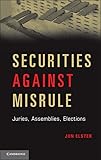Securities against misrule : juries, assemblies, elections / by Jon Elster.
Material type: TextLanguage: Spanish Publication details: Cambridge ; New York : Cambridge University Press, 2013.Description: xii, 324 p. ; 25 cmContent type:
TextLanguage: Spanish Publication details: Cambridge ; New York : Cambridge University Press, 2013.Description: xii, 324 p. ; 25 cmContent type: - text
- unmediated
- volume
- 9781107031739 (hardback)
- 9781107649958 (paperback)
- 302.3 23
- JF 1051 E49 2013
- POL010000
| Item type | Current library | Home library | Collection | Shelving location | Call number | Copy number | Status | Date due | Barcode |
|---|---|---|---|---|---|---|---|---|---|
 Libro
Libro
|
Biblioteca Juan Bosch | Biblioteca Juan Bosch | Ciencias Sociales | Automatización y Procesos Técnicos (1er. Piso) | JF 1051 E49 2013 (Browse shelf(Opens below)) | 1 | Available | 00000127355 |
Browsing Biblioteca Juan Bosch shelves, Shelving location: Automatización y Procesos Técnicos (1er. Piso), Collection: Ciencias Sociales Close shelf browser (Hides shelf browser)

|

|

|

|

|

|

|
||
| HV 6433.I722 W429i 2015 Isis : inside the army of terror / | JC 423 M252a 2014 After Occupy : economic democracy for the 21st century / | JC 599 S493 2009 60 anos da Declaração Universal dos Direitos Humanos : conquistas do Brasil / | JF 1051 E49 2013 Securities against misrule : juries, assemblies, elections / | JK 468.I6 C589f 2018 Facts and fears : hard truths from a life in intelligence / | JN 2738 S773 2013 Renseignement francais : nouveaux enjeux / | JZ 1670 F714 2014 The foreign policies of Middle East states / |
Includes bibliographical references (pages 289-313) and index.
Introduction; 1. The normative study of collective decision making; 2. Ignorance, secrecy, and publicity in jury decision making; 3. A dialogue with Bentham; 4. The optimal design of constituent assemblies; 5. Cross-voting: a study in failure; 6. Conclusion.
"This book proposes a normative theory of collective decision making, inspired by Jeremy Bentham but not including his utilitarian philosophy. The central proposal is that in designing democratic institutions one should reduce as much as possible the impact of self-interest, passion, prejudice, and bias on the decision makers, and then let the chips fall where they may. There is no independently defined good outcome that institutions can track, nor is there any way of reliably selecting good decision makers. In addition to a long initial chapter that surveys theories of collective decision making, notably social-choice theory, and a chapter expounding and discussing Bentham,Ŵs views, historical chapters on the jury, constituent assemblies, and electoral systems develop and illustrate the main ideas. This work draws on a welter of case studies and historical episodes, from Thucydides and Plutarch to the present. It is also grounded in psychology, behavioral economics, and law"-- Provided by publisher.


There are no comments on this title.